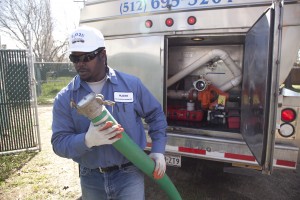LCRA Gets Its Own 18-Wheeler To Haul Water to Spicewood Beach
It’s been a few weeks since the small community of Spicewood Beach, which about 1,100 people call home, ran out of water. It was the first town to run dry during the Texas drought.
Since then, the Lower Colorado River Authority (LCRA), which owns and operates the wells in the town, has been paying an outside contracter to truck in water. That cost the LCRA $200 a load, and at anywhere from four to five loads a day, costs were adding up. (The LCRA has come under fire for selling over 1.3 million gallons from the wells last year to water haulers before the wells started to fail.)
But as of today, the LCRA has its own truck. An 18-wheel, 6,000 gallon behemoth that will make its way from a private water system about ten miles away to the tanks in Spicewood. The LCRA has had the truck for a while, but first had to teach its team how to drive it.
“The streets around Spicewood Beach are pretty tight, they’re pretty narrow,” says LCRA Water Operations Manager Ryan Rowney. “I want to make sure that my staff is fully aware and fully versed in how the truck operates, the turning radiuses. Just want to make sure that they feel comfortable operating this bigger truck, cause it’s much bigger than what we’ve been driving around.”
But Spicewood Beach residents are worried that this bigger truck will wreak havoc on their roads and potentially damage their property.
A popular way of getting around Spicewood Beach is by golf cart, not an 18-wheeler. “We want to be sure that we don’t cause any other issues with our hauling opeation that we’d have to work with our customers there and work to mediate road damage or damage to someone’s vehicle,” Rowney says.
The LCRA had been paying local water hauler H202U $200 a load to bring in 4,000 gallons at a time to Spicewood Beach. Now it will simply haul its own water, which will cost them $8 for the same amount. (Fuel costs, insurance and overhead will undoubtedly make that cost higher.)
In the meantime, the LCRA is looking at drilling a new, deeper well for the community. Martin Peterson, a resident, hopes that gets done soon. “Hopefully they get that other well drilled down below, get a little deeper and hopefully we have some more water down there,” he says. “Until we drill it, we don’t know.”
But the process of drilling a new well (and getting it approved by the Texas Commission on Environmental Quality) could take months. In the meantime, locals here are just glad that the taps are still running thanks to those trucks of water. “I can’t say it’s gonna fix everything,” local Diani Castillo says. “But it’s getting better.”





